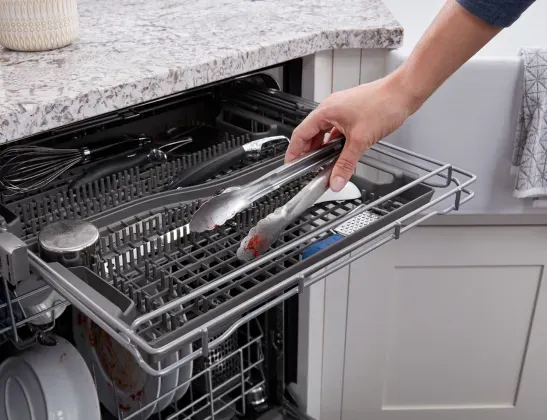5 Ways To Maximize Your Dishwashers Drying Cycle
Wed Apr 30 2025
- Dishwasher
Your built-in dishwasher is one of the hardest-working appliances in the home. It works diligently daily to remove all the gunk and bacteria from your dishes so that you don’t have to soak, scrub, sanitize, and dry every time you use a dish. That’s why it can quickly become a big concern when it’s not working at its best.
Let’s discuss five ways to maximize your dishwasher’s drying cycle so that your clean dishes come out completely dry every load, as well as some other tips you can follow to keep your dishwasher working at its best.

Tips To Maximize Your Dishwasher's Drying Cycle
Before you get down about your dishwasher not drying your dishes completely, here are a few easy tips you can try before troubleshooting an actual issue.
1. Load Your Dishwasher Correctly
The easiest tip to try first is to make sure you’re loading your dishwasher the right way. While each dishwasher is designed slightly differently from other units, there are general rules you can follow that will maximize your dishwasher’s drying cycle.
For starters, dishes should all be facing down towards the water jets. A bowl turned upward will fill with water and cannot be dried. Cups, bowls, and any other dish with a lip on its bottom will need to be loaded at an angle to help the water roll off.
You will also want to make sure your dishes have enough space between them. Dishes crammed on top of each other will not get enough airflow during the drying cycle and may come out pretty damp. Leaving enough space between dishes will also help make sure they’re being washed thoroughly.
If in doubt, seek the manual of your dishwasher, which explains how to load that specific model properly. Additionally, some models have better dishwasher drying features, so if drying is a big concern, consider upgrading.
2. Use A Pre-Rinse Aid
Have you ever noticed that extra dispenser in your dishwasher is designed specifically for rinse aid? A rinse aid may seem so extra, but it actually can significantly help your dishwasher dry clothes.
A rinse aid, or sometimes called a rinse agent, is considered a surfactant, which means it reduces the surface tension of any liquid it is dissolved in. It makes water less able to form into the type of droplets that turn into water spots. Instead, it will easily slide off your dishes so that your dishes dry more easily.
If you’re looking for a more natural option, you can try using white vinegar instead of a rinse aid. It can offer some of the same effects while also removing odor.
3. Use The Heat
Your dishwasher doesn’t pull in your home’s hot water to wash your dishes. Instead, it uses a heating element to heat the water to a high enough temperature to remove debris and kill the bacteria on your dishes easily.
If your dishes aren’t getting dry, you might not be using the correct cycle. Try to run your dishwasher at a high-heat wash cycle, such as Sanitize, or use a heated dry cycle. Your dishwasher will use this extra heat to evaporate the water during the drying cycle, giving your dishes a better chance to fully dry.
4. Allow Airflow After Each Load
If you’ve tried the above tips and your dishes are still not fully dry, it may be not getting the airflow it needs for condensation to leave the unit.
After your next dishwasher load, simply crack the door open a few inches to allow the moisture to leave the unit. Don’t open it completely because you will still want to keep a majority of the heat inside the cavity to assist in drying. Older units may need more airflow than newer units, and this is an easy fix to try instead of prematurely replacing your unit.
5. Open Bottom Rack First
If your dishes are still coming out with water pooling on top of cups or bowls, the last thing we recommend is trying a certain unloading method.
After opening the door, don’t pull any of the top racks out first. This movement can make all the water fall off your dishes and onto the dishes below. Instead, start by pulling out the bottom rack and unloading it first. Then move to the middle rack and finally the third rack.
While the issue may not be completely resolved, this at least cuts the work of hand drying some of your dishes in half.

Should You Repair or Replace Your Dishwasher?
Sometimes, no matter how many rinse-aid hacks or extra-dry cycles you try, your dishwasher just isn’t keeping up. If that’s the case, you might be dealing with a bigger issue, like a faulty heating element, vent, or motor. So the big question is: should you repair it, or replace your dishwasher altogether?
A good rule of thumb is if the repair involves both water and electricity (anything with a motor, wiring, or heating coil), don’t DIY it. Leave it to certified experts like the team here at DeWaard & Bode. Our factory-certified technicians handle repairs on all major brands and are the most trusted service pros in Whatcom and Skagit counties. You can schedule a dishwasher repair service or give us a call. We’re here to help.
When to Replace a Dishwasher
-
If the repair costs more than the original dishwasher (especially if you paid $400 or less), upgrading might be more cost-effective.
-
If the unit’s over 8–10 years old, it’s probably reaching the end of its lifespan anyway. Even budget-friendly new models now come with energy-efficient features and improved drying performance that didn’t exist a few years ago.
-
If you're just ready for an upgrade (no shame in that), now’s a great time. Many of our customers are switching to quieter, smarter dishwashers with advanced drying options like AutoAir™ or ProDry™—without spending a fortune.
Explore Dishwashers For Sale at DeWaard & Bode
At DeWaard and Bode, we offer a large selection of dishwashers from the best names in the industry at price points that are sure to fit any budget. We also offer portable dishwashers, dish drawers, and more.
Contact us or visit one of our appliance stores in Bellingham or Burlington, Washington, to speak with our appliance experts. We’ll help you choose a dishwasher that makes doing the dishes easier and more rewarding. We also offer scratch-and-dent dishwashers for a budget-friendly upgrade option!
Related readings from our blog:

FAQ: Questions About Maximizing Your Dishwasher’s Drying Cycle
1. How do I get my dishwasher to dry better?
Use rinse aid, select the correct drying cycle, avoid overloading, and crack the door open after the cycle ends.
2. Why are my dishes still wet after the dishwasher cycle?
This often happens due to missing rinse aid, turning off the drying setting, or trapping moisture with overcrowded racks.
3. Does rinse aid help with drying?
Yes! It reduces surface tension, allowing water to slide off dishes instead of forming droplets that linger.
4. Will dishes dry in a closed dishwasher?
Somewhat—but not as well. Trapped steam can cause condensation, especially on plastic. Cracking the door helps a lot.
5. What does “Extra Dry” do in a dishwasher?
It extends the drying phase, often with added heat or fan support, to help evaporate more moisture, especially helpful for plastics.
Related Articles
